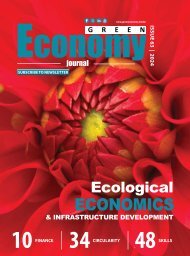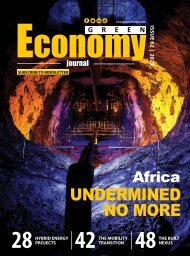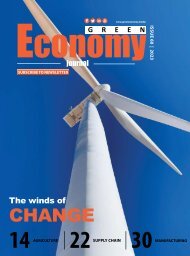Green Economy Journal Issue 57
Create successful ePaper yourself
Turn your PDF publications into a flip-book with our unique Google optimized e-Paper software.
ENERGY<br />
ENERGY<br />
What the world<br />
is learning<br />
from SA’s nascent<br />
JUST ENERGY TRANSITION<br />
INVESTMENT PLAN<br />
Ramaphosa has been praised by global leaders for South Africa’s efforts to prevent and avert the<br />
worst effects of human-induced climate change as part of its Just Energy Transition Investment Plan.<br />
BY ETHAN VAN DIEMEN<br />
South Africa’s Just Energy Transition Investment Plan (JET-IP) is<br />
designed to accelerate the move away from coal in a way that<br />
protects vulnerable workers and communities and develop<br />
new economic opportunities such as green hydrogen and electric<br />
vehicles (EVs). It is part of South Africa’s efforts to prevent and avert<br />
the worst effects of human-induced climate change.<br />
UK Prime Minister Rishi Sunak, US President Joe Biden, French<br />
President Emmanuel Macron and German Chancellor Olaf Scholz<br />
have commended South Africa for its commitment to clean energy<br />
but importantly the country’s emphasis on assisting workers and<br />
communities who will be affected by job losses as we become less<br />
reliant on the coal industry.<br />
Earthlife Africa director Makoma Lekalakala welcomed the five-year<br />
R1.5-trillion investment plan, summing up why our JET-IP is a gamechanger<br />
for South Africans. “We need clean, cheap renewable energy<br />
to end the loadshedding caused by our failing coal fleet, and to address<br />
the energy poverty that is hampering social justice and development<br />
for all.”<br />
South Africa is among the top 20 highest emitters of planet-warming<br />
greenhouse gases in the world and accounts for nearly a third of all<br />
of Africa’s emissions, due in large part to Eskom’s legacy dependence<br />
on coal for electricity generation. From the way we move people and<br />
goods around to how we light up our streets and homes, the plan seeks<br />
to clean up South Africa’s act without leaving anyone behind.<br />
Mandy Rambharos, former general manager of the Just Energy<br />
Transition office at Eskom said several banks, including the World Bank<br />
and African Development Bank, said South Africa’s plan is the best they<br />
had seen on the table out of 14 plans from around the world. “While I<br />
was at Eskom, we were approached by the Vietnamese, Indonesians,<br />
Philippines and Indians ... wanting to collaborate with us.”<br />
One of the reasons that South Africa is recognised as a leader in its<br />
moves towards JET is because of the multistakeholder consultative<br />
process that saw the drafting of a Just Transition Framework.<br />
The Presidential Climate Commission (PCC) in July last year released<br />
the framework that sets out a shared vision for JET, principles to guide<br />
the transition, and policies and governance arrangements to give<br />
effect to the transition from an economy that is predominantly reliant<br />
on fossil fuel-based energy, towards a low-emissions and climateresilient<br />
economy. Dr Crispian Olver, executive director of PCC, said<br />
that “a lot of the international partners … are looking to build a model<br />
[such as] in South Africa, and then expand it and replicate it elsewhere.<br />
“We’ve also heard the same from many of our sister developing<br />
countries and they’re not looking to exactly replicate what we’re doing<br />
… but we’re acutely aware that countries like Indonesia, Vietnam, India,<br />
Brazil and several African partners are all embarking on very similar<br />
energy transitions and they’re having to grapple with the economic<br />
and social consequences of those transitions”.<br />
Olver shared some of the lessons that South Africa offers to other<br />
countries. These include to:<br />
• Be consultative<br />
• Be inclusive<br />
• Make use of forums such as climate commissions<br />
At COP26, in what was hailed as a “watershed” moment for South Africa<br />
and international collaboration, a political declaration announced the<br />
mobilisation of $8.5-billion to accelerate our move away from its ageing,<br />
10 11

















